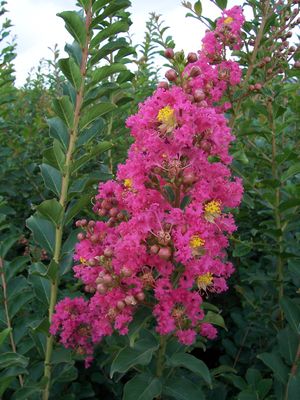Print This Page
Crape Myrtle, Tuscarora
Lagerstroemia indica 'Tuscarora'
Tuscarora Crape Myrtle (Lagerstroemia indica 'Tuscarora') is a standout variety known for its vibrant coral-pink blooms and superior resistance to powdery mildew. It thrives in Texas landscapes, offering a long flowering season from summer to early fall. Like other Crape Myrtles, it is highly adaptable to heat, drought, and various soil conditions once established, making it an excellent choice for ornamental planting, street trees, or privacy screens.
This variety prefers full sun and well-draining soil, though it can tolerate both acidic and alkaline conditions. Tuscarora Crape Myrtle is relatively deer-resistant and non-toxic, making it a safe choice for residential gardens. Proper pruning in late winter helps maintain its structure and encourages prolific blooming, as flowers develop on new wood.
Tuscarora Crape Myrtle grows as a medium to large tree, reaching 20 to 25 feet in height with a spread of 15 to 20 feet. Its strong branching structure and uniform canopy make it an excellent specimen tree. When planting in a row or grouping, space trees 15 to 20 feet apart to allow for proper air circulation and canopy development.
During winter, this variety is fully deciduous, shedding its leaves to reveal beautiful exfoliating bark in shades of cinnamon and gray. It is hardy to USDA zones 7-10 and does not typically require winter protection in Texas. However, young trees benefit from a layer of mulch around the base to insulate the roots in colder areas.
 |
Powdery Mildew Resistant |
 |
Long Lasting Blooms |
 |
Heat & Drought Tolerant |
Flower Color:Light Red
|
 |
Height:20-25 Feet
|
 |
Spread:15-20 Feet
|
 |
Spacing:15-20 ft
|
USDA Hardiness Zone 7a
Available Sizes:
| Item |
Description |
| CRA-TUS-05 |
#005 CRAPE MYRTLE, TUSCARORA (RED) |

|
| CRA-TUS-15 |
#015 CRAPE MYRTLE, TUSCARORA (RED) |

|
| CRA-TUS-30 |
#030 CRAPE MYRTLE, TUSCARORA (RED) |

|
| CRA-TUS-45 |
#045 CRAPE MYRTLE, TUSCARORA (RED) |

|
Characteristics & Attributes
|
Deer Tolerance
|
Exposure
| • |
Full Sun |
| • |
Full Sun to Part Shade |
|
Habit
|
Soil pH Preference
|
|
Water Needs
|
Tolerates Poor Drainage
|








